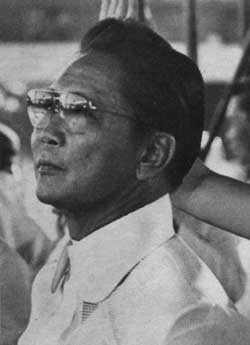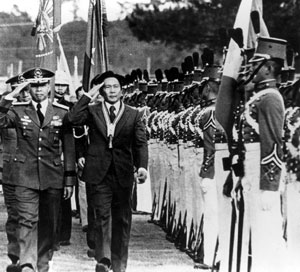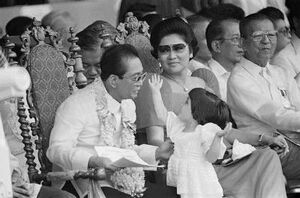
|
Outdated Template In Use! | |
| Please note that the template that you are using is outdated. This may cause issues with the template, the page and the wider Particracy Wiki! Please the current list of supported and up to date templates located here: Templates Manual of Style. If you need assistance please contact Wiki Administrator Auditorii via the in-game forums or Discord. |
| Diosdado R. Hortál | |

| |
President of Indrala
| |
| In office August 31, 2816 – October 1, 2819 | |
Preceded by
|
Itoskti Sama
|
|---|---|
Succeeded by
|
Sin-Chu Lee
|
President of Indrala
| |
| In office August 31, 2808 – August 5, 2812 | |
Preceded by
|
Yukio Kimura
|
Succeeded by
|
Itoskti Sama
|
1st Leader of the Nationalista Party
| |
| In office December, 2804 – April, 2821 | |
Succeeded by
|
|
Born
|
June 9th, 2764
|
Died
|
July 29th, 2835 Atyr, Kanjor
|
Political party
|
|
Spouse
|
|
Children
|
Diodado Hortál, Jr.
Indira Hortál Bobo Hortál |
Occupation
|
Army Officer, Politician
|
Religion
|
Orthodox Catholic
|
Early life and career
Diosdado Rangpan Hortál was born June 9, 2764, in the small village of Edralin, just outside Huzan City in Quibashi, to parents Macapagal Hortál and Iryan Pranambung . He is from mixed raced descandence: through his paternal greatgrandparents he is from Rildanorian and Indralan descandence and through his mother he is from Gao-Showan ancestry. He was baptized into the Orthodox Catholic Church.
Military career
Of very humble origins, Hortál began working at a very early age. A self-educated man, he attended night school and is said to have been a voracious reader. He bought a ticket to Huzan and joined the army in 2783, and after graduation, he progressed through the ranks. After promotion to Sergeant, Hortál became the union leader of Indrala's soldiers.
Marriage and family
In 2800, Hortál met actress and former beautyqueen Mimi Arisetyowato. Her photogenic face graced many of Indrala's magazine covers and she was named the "Muse of Kigami". They were married in May of that year at the National Cathedral in Kigami. They have four children: Diosdado Hortál, Jr. (2801), Indira Hortál (2802) and Bongoritsu "Bobo" Hortál (2804).
The Coup of 2800
In an uprising known as the "Revolt of the Sergeants," the army staged a coup d'etat on September 6, 2800. The coup overthrew the corrupt government of Thomas Eddie, who was succeeded by Su-Chin Lee of the LAN Party. Hortál became the Army Chief of Staff, with the rank of colonel, and effectively gained a huge influence on the government.
Initially a presidency composed of five members, one each anti-Eddie faction, was created, but within days the representative for the students and professors of the University of Kigami, Su-Chin Lee of the LAN Party, was made president, but Hortál effectively controlled the presidency. The majority of the commissioned officer corps was forcefully retired or, as some speculate, were killed. Hortál became the strongman behind "puppet presidents" Lee and Kimura.
Lee was president for four years before Hortál forced him to resign in 2804. He was replaced by the Chairman of the National Assembly, the Liberal Democrat Yukio Kimura.
Nationalista Party
LDP-President Kimura's new government was highly inefficient and full of corruption. Hortál and some other high military officer descided that is was time for change. The nation needed a strong leader, a real strong leader, who can turn the "Banana Republic of Indrala" into a modern and whealthy nation, as Hortál said.
Hortál descided to run for President himself. This marked changes in the political climate of the country. In December 2804 he founded the Nationalista Party, a populist and nationalist party, and start campaigning for presidency for the 2808 elections.
First Presidency (2808-2812)

Inauguration of Hortál as President of Indrala, August 2808

The President and his wife visiting a school near Kigami, 2809
In August 2808 he was elected President of Indrala with almost 88% of the votes, thereby defeating incumbent president Yukio Kimura. He was given a warm welcome by the international community. With a young and dynamic democrat in Indrala, the underdeveloped island could finally gain some progress after years of corruption. Hortál was seen as a strong leader with hope who could open doors for Indrala that were always been closed for his predecessors.
In his first term Hortál tried to stabilize the financial position of the government through an intensified tax collection. He also borrowed heavily from international financing institutions to support a large-scale infrastructure works projects were built. He improved agricultural production to make the country self-sufficient in food, especially in rice. He also urged the revitalization of the judiciary, the national defense posture and the fight against smuggling, criminality, and graft and corruption in the government.
The "New Society"
Hortál instructed his economic advisors to develop a five-year plan aimed at increasing workers' pay, achieving full employment, stimulating industrial growth of over 40% while diversifying the sector (then dominated by food processing and textile manufacturing), and greatly improving transportation, communication, energy and social infrastructure (in the private, as well as public, sectors). In early 2809 he launched this new political program, the New Society. Herefor he increased the national budget with allmost 750 billion INS.
To accomplish his goals Hortál mobilized the manpower and resources of the Armed Forces of Indrala for action to complement civilian agencies in such activities as infrastructure construction; economic planning and program execution; regional and industrial site planning and development; community development and others. The President, likewise, hired technocrats and highly educated persons to form part of the cabinet and staff. The employment of technocrats in key positions and the mobilization of the Armed Forces for civic actions resulted in the increasing functional integration of civilian and military elites.
Hortál's planning prominently included political considerations, of course. Numerous military allies were fielded as candidates, notably Colonel Boran Ranchipur, when elected Minister of Infrastructure, became renowned for his housing program. The period of Hortál's first term as president is well-remembered for its record social investments. The Minister of Health and Social Services, neurologist Dr. Rinalda Tamil, oversaw the completion of over 4,200 health care facilities. Related works included over 1,000 kindergartens and over 8,000 schools, including several hundred technological, nursing and teachers' schools, among an array of other public investments. In 2811, he raised the budgets of Health and Education with another 500 billion INS, to set up social programs in the inlands and remote areas of Indrala, to upgrade Health and Education standards in this regions.
Agricultural Revolution
The Hortal administration also wanted to increase the number of farms and other agricultural companies in remote and thin populated areas. To make the country self-sufficient in food, more farmers were needed. The high unemployement in the big cities was a tremendous sollution for the government to forcing thousands of people from the cities to work on communal farms in the countryside. The agricultural profits of Indrala rose from 48% of the entire exports in 2808 to 60% in 2812.
International Relations

President Hortal with Hulstrian Prime Minister Von Hortensiengau during a state visit in Kien, September 2810

A large statue of Diosdado Hortál, build between 2811-1812, as part of the huge personality cult surrounding Hortál
Hortal also tried to strengthen the foreign relations of Indrala. He hosted a South Selayan nation summit conference on the economic situation in the region in October, 2809.
Hulstrian Ambassador Gustav von Stroheim enjoyed a particularly warm relationship with Hortál, a bond Hortál hoped would facilitate special access to the Ewald administration in Hulstria. During his first term, President Hortál build up a strong and very good relationship with the Hulstrians. In April 2811 both governments agreed on the the Hulstria-Indrala Economic Friendship Pact. This pact resulted in a huge economic boost in Indrala, after many Hulstrian businesses opened in Indrala.
The Hulstrian government recognized Indrala as a special friend, but the culture of corruption and the dictatorial tendencies of the Hortál government worried some Hulstrian officials.
Corruption and embezzlement
During his last year, Hortáls's administration was marred by rampant corruption and political mismanagement by his relatives and cronies, which culminated with the arrest of several members of the opposite Gekokujo party. Critics considered Hortál the quintessential kleptocrat, having looted billions of dollars from the Indralan treasury. Later on in his presidency Hortál developed a personality cult in Indrala surrounding him, requiring businesses and schools all across Indrala to have his official presidential picture or their facilities shut down. In addition, Hortál's propaganda messages were placed all across the island, many of them taking the place of billboard advertisements. The large personality cult also led to disdain. He also silenced the several newspapers and radiostations, making him look more and more like a dictator.
The last year of his presidency witnessed the radicalization of the country's student population, supported by opposition party Gekokujo. Students in various colleges and universities held massive rallies and demonstrations to express their frustrations and resentments. Violent maoist protests did not end. In February 2812, a series of violent events occurred on numerous campuses in Kigami, cited as “an explosion of pillboxes in at least two schools.”
Downfall
On 4 August 2812, elections were held. Incumbent president Hortál only received 17% of the votes, while his opponent, opposition leader Itoskti Sama from the Gekokujo party, received allmost 82% of the votes. Hortál refused to accept the, in his eyes, "allegedly fraudulent" result. He refused to step down and to recognize Itoskti Sama as winner of the elections. In the evening of August 4, Hortál send a message to all the television and radio stations in which he declared the elections illegal and ordered to arrest Itoskti Sama "to save the democracy and keep the peace in the country".
Later that evening, angry demonstrators numbering about 50,000 supporters of the Gekokujo party, students and laborers stormed the Presidential Palace, burning part of the medical building and crashing through the gate with a fire truck that had been forcibly commandeered by laborers and students. Tear gas grenades finally dispersed the crowd, giving the Hortál family and their close associates time to leave the Palace.
At about nine o'clock that night, Hortál and his family sneak out the back door of Presidential Palace to the palace's backyard, where helicopters are waiting to take the (former) President and his family to about Manishuro Air Base, about 83 kilometers west of Kigami. In the early morning of August 5th, the Rildanorian Royal Navy ordered to evacuate Mr. and Mrs. Hortál, and members of the government. Hortál went into exile in Rildanor, after asylum was granted to him by the Rildanorian government.
Life in exile
Second Presidency (2816 - 2819)
In 2818, he supported a large scale land reform. With Act 3b of his New Society Program, he proceeded some revolutionary agricultural reforms. Instead of the free market system, the government intervered in the farm productivity. The government subsidises agriculture based on market demand for the crop being grown. He also wanted to raise the agricultural production to make the country self-sufficient in food, especially in rice. Therefor he encouraged small farms to merge together into larger ones. The rice productivity rose with almost 25%, but many small frmer lost their jobs due to the reforms.
